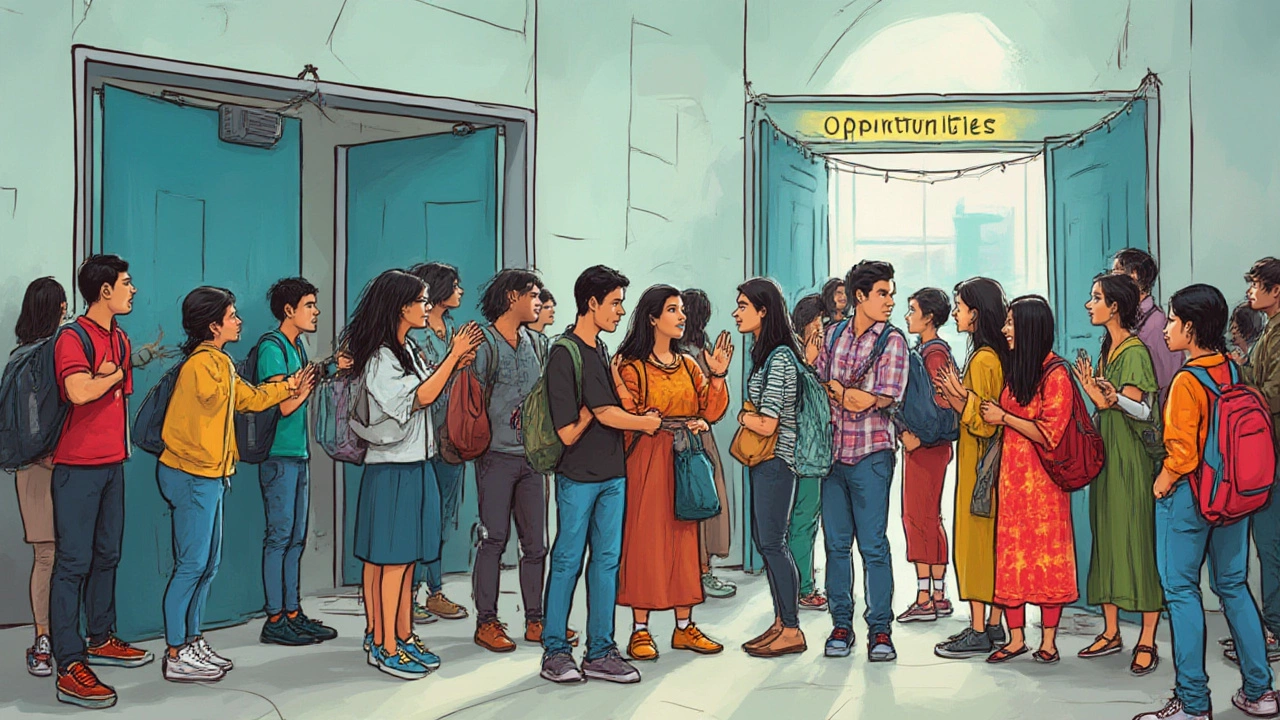1 Aug
2025
Least Useful Degrees: What Not to Study for Career Success

Picture this: my son Zane is at the kitchen table, staring at a stack of college brochures like the world’s worst card game. He flips one over and says, “Dad, what’s the LEAST useful degree anyone could get?” There’s a reason this question stings for so many parents, students, and even university professors. Every family knows at least one story of a cousin or friend who spent four years and a bucket of cash, then ended up in a job that didn’t need the degree at all. With tuition climbing higher than most people’s savings accounts, nobody wants to toss their money or time into something that’s basically a shiny piece of wall art. So, what’s the real story behind the least useful degree?
The Degrees People Warn You About — Are They Really Useless?
There’s a list that floats around on social media and the news: the most “useless” degrees. You’ve probably seen the memes about philosophy or art history—sometimes even my daughter Tangerine has sent me TikToks joking about “finding yourself” after four years and tens of thousands in student loans. But before we throw out certain majors, let’s nail down what we mean by “least useful.” Are we talking about earnings? Job opportunities? Or the value it brings to a person’s life? Because sure, a degree in basket weaving sounds funny, but maybe it’s not all about money.
Still, most people ask this question because they want a return on investment. According to the US Bureau of Labor Statistics, graduates in STEM (science, technology, engineering, and math) fields land jobs much faster and with bigger paychecks than those majoring in the arts or humanities. In 2023, the unemployment rate for recent computer science grads was 2.3%, while for performing arts it was 7.2%—that’s a huge gap. And then there’s pay: chemical engineers were reporting average starting salaries over $74,000, compared to $38,000 for history majors. Ouch.
But the story isn’t as simple as dunking on art majors. If your passion is painting or writing plays, you might find other rewards—just maybe don’t expect to make bank. The “least useful” label really comes down to what your goals are and whether you’re ready to hustle in tough job markets.
The Offenders: Which Degrees Get the Bad Rap?
Year after year, the same degrees show up on the so-called “worst” lists. Let’s look at a few—fair warning, you might have already guessed them:
- Philosophy
- Anthropology
- Art History
- Religious Studies
- Film Studies
- Music (Performance or Theory)
- Gender Studies
A 2024 study from Georgetown University’s Center on Education and the Workforce mapped out employment and average salary by college major. Majors like “Drama and Theater Arts” had one of the highest rates of people working jobs unrelated to their field—almost two-thirds. Art majors topped the list of graduates living with parents, at 20%. There’s a reason folks joke about art history grads becoming baristas, but that comes with a scoop of truth: the degree rarely leads directly to jobs that ask for those skills.
Anthropology and philosophy graduates do pick up critical thinking, research, and communication skills—but only 31% held jobs directly related to their degree within six years of graduation. Meanwhile, degrees like business administration, nursing, and engineering see over 60% of grads land in roles tailored to their studies. Here’s a quick look at how starter salaries and employment rates compare among so-called "useless" and "useful" degrees:
| Major | Avg. Entry Salary (2024) | Relevant Employment (%) |
|---|---|---|
| Philosophy | $38,900 | 29% |
| Anthropology | $36,500 | 31% |
| Drama/Theater | $36,200 | 23% |
| Business | $54,900 | 63% |
| Engineering | $74,600 | 68% |
| Computer Science | $71,100 | 65% |
Here’s the catch: a degree’s “usefulness” isn’t always about money. You’ll find the rare history grad who crushes it on YouTube or the philosophy major who becomes a best-selling author. But if you’re playing the odds, these “offender” degrees are the ones experts warn you about the most.

The Shifting Job Market: Does ‘Useless’ Even Mean Anything Now?
The job market in 2025 isn’t what it was a decade ago. AI, automation, and remote work have flipped things upside down. Jobs that used to need a degree now demand certifications, real-world experience, or tech know-how. Thirty years ago, people picked degrees and stuck with their fields. Now, even tech skills from five years ago can go stale overnight.
Take journalism, for example. When I was picking my major, journalism seemed recession-proof. But now, even top journalism schools warn students to have a backup plan. Shrinking newsrooms and the shift to digital means there are fewer “classic” reporter jobs—replaced by content creators, podcasters, and social media managers. Sure, a journalism degree isn’t as “useless” as, say, puppetry (which is a real degree at some schools), but it’s a lot riskier than it once was.
Here’s a twist: some degrees that sound “useless” suddenly get popular. During the COVID-19 pandemic, public health majors were suddenly gold. Ten years ago, almost nobody talked about cybersecurity as a hot career—now those grads get snapped up within weeks. It’s all about timing, and sometimes luck. If a student bets on a degree that becomes essential, the supposed “offender” list flips in seconds.
But chasing trends isn’t a guarantee. Majors like hospitality and tourism were booming in 2019, but then travel tanked during global lockdowns and those grads got stuck. The lesson? Sometimes what’s “useless” is really just “out of season.”
Why Students Pick These Degrees Anyway
If a degree offers such slim job prospects, why do thousands still sign up? The short answer: passion. Not everyone wants to spend their days buried in Excel sheets or coding apps. When my daughter Tangerine announced she was considering a fine art degree, friends and family reacted like she’d admitted to joining a circus. But the truth is, young people want their lives to mean something. That urge to express yourself and study something you love is powerful.
Another factor: guidance counselors rarely have up-to-date info on salaries or job prospects. They still repeat the idea that “any degree is good” and that “passion leads to success.” There’s some truth in that. But most grads don’t realize just how tough the market can be until they’re scrambling for a paycheck.
There’s also a lot of pressure from movies and media about “following dreams.” You see the rare art student making millions or the philosophy major who founds a tech startup, but you don’t see the thousands who end up piecing together gigs, freelancing, or switching careers entirely. Parents sometimes push kids into degrees they think are safe, but this can also backfire if the student’s heart isn’t in it. Burnout and dropping out happen more often when people study something they couldn’t care less about.
Cost matters, too. Not everyone can afford five years of trial and error. Tuition is at an all-time high. The average American student loan debt hit $39,000 in 2024, up from $26,000 a decade earlier. If you’re going to invest that much, you want to make sure it isn't in a field with no jobs.

Making Smarter Picks: Tips and Alternatives for the Cautious
If you want to avoid the “least useful degree” trap, here are some ground rules I give my own kids:
- Research employment data before committing. The Georgetown study is a good starting point, but also check LinkedIn, Reddit job forums, and local companies' hiring trends.
- Pair a “risky” major with a practical minor or certification. Love philosophy? Add data analysis or teaching credentials. This gives a safety net if the passion path doesn't pay the bills.
- Network like crazy from day one. Most job opportunities come from connections, not just a degree. Intern, volunteer, join clubs, go to conferences—anything that puts a name to your face.
- Embrace side projects and internships. Employers value skills, not just diplomas. Build a portfolio—art, writing samples, coding projects, whatever fits your field.
- Think about cost versus outcome. Community colleges or state schools sometimes offer just as much value at a fraction of the price, especially if the major is risky.
- Stay flexible—many jobs don’t care about your major but do care that you can solve problems and learn fast.
- Understand debt load. Use online calculators: how long will it take to pay off your loans based on your major’s average salary?
Here’s a hack: schools with work-study programs or co-op tracks (where you alternate semesters in class and on the job) have much higher employment rates. Northeastern University, for example, reported 93% of grads with co-op experience had full-time offers in their field by graduation.
Some students skip college altogether now, especially for fields like coding, design, or trades. Earning a certification in app development or digital marketing can take one year and net you a starting salary of $55,000—no expensive degree required. A buddy of mine in Dallas went from high school grad to Google Cloud engineer in 18 months, thanks to a bootcamp, not a four-year degree. Not every field needs a diploma anymore—just skills and hustle.
Here’s the bottom line: don’t pick a degree because your guidance counselor, a TikTok star, or a nervous parent tells you it’s the “right” choice. The real “least useful degree” is the one you regret because it closed doors, buried you in debt, or left you totally lost about next steps. Be honest about what you want your life to look like in five years. Study what you love, sure, but stack the odds in your favor by learning how to adapt and add practical skills. Money isn’t everything, but freedom sure helps.
Write a comment ( All fields are required )